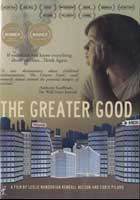
The Greater Good 2014
Distributed by Janson Media, 88 Semmons Road, Harrington Park, NJ 07640; 201-784-8488
Produced by Leslie Manookian, Kenall Nelson, and Chris Pilaro
Directed by Kendall Nelson and Chris Pilaro
DVD , color, 84 min.
College - General Adult
Delivery of Health Care, Children, Child Development Disorders
Date Entered: 02/23/2015
Reviewed by Brandon West, Instructional Design Librarian, State University of New York at OswegoMany children are given vaccinations for the presumed benefit of disease prevention. And while vaccinating children has helped save countless lives, what happens when the vaccinations have a negative effect on the child? While the media often portrays the controversies surrounding vaccination as black and white issues, this documentary delves into the grey area by exploring what happens when “one sized fits all” preventative measures end up hurting or disabling children.
The documentary revolves around three different families across various regions in the United States. Each family is living with the negative consequences of vaccination. One child named Jordan was born healthy, but began a slow dissent into autism, which seems to be connected to the vaccinations he received. A teenager named Gabi had two strokes, experiences seizures and suffers from memory loss issues after being treated with Gardasil, a vaccine for cervical cancer. Finally, The Christener family is recovering after their infant daughter passed away from medical complications connected to the vaccinations she received. Each of their stories brings forth many different questions regarding vaccination that should be asked and explored both by parents and the scientific community.
While the idea of “anti-vaccination” might rile imagery of angry mothers or religious fundamentalists, the film explores a much more rational side of the issue. The message of the film is to better educate parents about vaccinations and so they can make informed decisions about their children’s health. The film explores the role of government in vaccination, identifies the gaps in the research, and explores the connection between the children’s illnesses and vaccination. It also discusses the potential conflicts of interests between the pharmaceutical companies, the Food and Drug Administration, and doctors.
This film will appeal both to general audiences and is appropriate for college courses that are either exploring controversial issues or health topics. There is much presented in the documentary that can be discussed, researched, or debated by students in the classroom. Academic libraries should consider this film for their collections, as there are not many films that address the issues brought up in this film. Overall, the film will ignite conversation and hopefully get individuals to start asking more questions about the science and roles of vaccination in our society.
Awards
- 2011, Koroni Award, Sidewalk Moving Pictures Film Festival
- 2011, Cinematic Vision Award, Amsterdam Film Festival